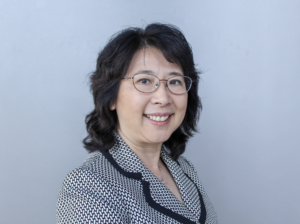 Lihua Liu, an associate professor of clinical Population and Public Health Sciences, has been named the director and principal investigator of USC’s Cancer Surveillance Program (CSP).
Lihua Liu, an associate professor of clinical Population and Public Health Sciences, has been named the director and principal investigator of USC’s Cancer Surveillance Program (CSP).
Established by faculty members in USC’s Department of Population and Public Health Sciences in 1972, the CSP is responsible for recording all cancer diagnoses in Los Angeles County. It is part of the California Cancer Registry (CCR) and a member of the National Cancer Institute (NCI)’s Surveillance, Epidemiology, and End Results (SEER) Program. By collecting information on cancer diagnoses across the state and nation, these organizations provide data that can be used to identify trends, inform prevention and treatment strategies, and improve public health.
Liu brings to the role a unique set of qualifications and a long history with CSP. As a PhD student in USC’s Department of Sociology, she combined socioeconomic data from the U.S. Census and cancer incidence data from the CSP to examine the relationship between socioeconomic status and cancer risk among L.A. County’s racially and ethnically diverse population.
After earning her PhD, Liu stayed at the CSP, completing postdoctoral training and then accepting a position as a staff research scientist. She joined the faculty as an assistant professor of clinical Population and Public Health Sciences in 2008. Over the years and in various roles, Liu has accumulated extensive knowledge of registry operations and developed a wide professional network with local, state, national, and international counterparts and collaborators. With a PhD in demography—the study of human populations—Liu has enriched CSP’s data by paving the way for researchers to study cancer risk in different segments of the population.
As an immigrant herself, Liu became fascinated by cancer risk in the approximately 13 percent of U.S. residents who were born in another country.
“I have become an advocate for better cancer surveillance and more research among this growing but often overlooked segment of the U.S. population,” Liu said. “Studying immigrants may prove vital in understanding the non-genetic factors in cancer development to advance cancer control strategies.”
Liu succeeds Dennis Deapen, professor of clinical Population and Public Health Sciences, who led the CSP from 1988 to 2020.
“With a background in demography, Lihua has provided multiple population-wide innovations to the CSP and the researchers who use the data. She has led local and national work on the classification and analysis of cancer by racial ethnic group and has provided multiple mechanisms to share population-based cancer research opportunities with faculty and students,” Deapen said. “I’ve enjoyed sharing her research interests in the fascinating findings that can be extracted from analyzing cancer data among immigrants to Los Angeles and California, and how our CSP data can improve their experience.”
As CSP director, Liu will oversee registry operations and research development. Her priorities include building CSP’s analytical support capability, developing data mining tools to better support innovation and collaboration for cancer research, and boosting the accessibility and usability of data for cancer control activities.
She also plans to make CSP data, which has resulted in more than 10,000 peer-reviewed articles to date, more integrated into USC’s teaching and research objectives.
“The CSP is a goldmine of data that is waiting to be analyzed,” Liu said. “But knowing how to make use of such a rich and complex data source can be daunting. I want to create collaborative opportunities that enable junior researchers to get a start in cancer surveillance research, and at the same time advance our knowledge to better control and prevent cancer.”
More about the L.A. Cancer Surveillance Program:
- Population-based cancer registry for Los Angeles County
- Established by USC Department of Population and Public Health Sciences faculty members in 1972
- Became part of the new California Cancer registry in 1988
- Joined the National Cancer Institute (NCI)’s Surveillance, Epidemiology, and End Results (SEER) Program in 1992
- A member in the North American Association of Central Cancer Registries (NAACCR)
- Long-time contributor to International Association of Cancer Registries (IACR) and International Agency for Research on Cancer (IARC)
- Contains more than 1.7 million cancer records diagnosed among residents of Los Angeles County since 1972
- Annual case count over 45,000
- Employs 28 full-time staff members plus affiliated faculty researchers
- Data used in more than 10,000 peer-reviewed publications